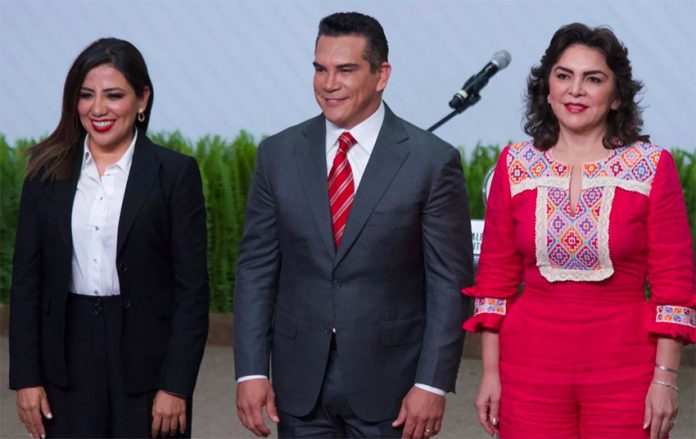A year after the crushing election defeat of the once omnipotent Institutional Revolutionary Party (PRI), three candidates vying to be its national leader engaged in a lively and sometimes hostile debate last night in front of a vocal crowd.
Ivonne Ortega, a former governor of Yucatán, quickly went on the attack against her main rival, Alejandro Moreno, who took leave as governor of Campeche in June to contest this Sunday’s ballot.
“You put 35,000 more families in poverty and at the same time as that was happening, you built a house, a 46-million-peso white house, by the way,” Ortega said, seeking to paint a picture of Moreno as an inept and corrupt governor.
“Actions speak much louder than words,” she declared.
The ex-governor said that Moreno must clarify where the resources to purchase his property came from and charged that corrupt members must be expelled from the party to help the PRI shed its corrupt image.
Some of Ortega’s supporters joined in the attack, shouting at Moreno that he was “corrupt” and a “thief.”
The ex-Yucatán governor continued her verbal assault:
“A small group of leaders hijacked the party and took decisions that led the PRI to where it is [today],” Ortega said, referring to its poor performance at the polls last year, when it was reduced to a weakened third force on the national political stage.
“I want to ask you, candidate of the upper echelon . . . Do you want to be remembered as the candidate who aspired to the PRI [leadership] but with force and by force expelled people if they thought differently? Do you want to be remembered as the PRI candidate that with force wanted to impose his will?”
In response, Moreno urged Ortega not to “generate more division” in the party and not to lie to PRI members as part of a ploy for her own personal gain.
As his supporters broke into chants calling for party unity, he said party members have to work together to become a strong opposition that stands up to the government of President López Obrador.
“Mexico is living today the most important challenge and vital moment in its political history. Do we want a Mexico in development or to go backward 50 years?” Moreno said.
“We have a government without a compass . . . We need to build a party that is critical . . . never again [can we be] a mute party that doesn’t call out the big mistakes of this government,” he added.
The third and least known candidate, Lorena Piñón, called for Ortega and Moreno to put their differences and slanderous remarks aside in order to build a united party that “together combats the errors of the government of López Obrador.”
Despite that advice, the former director of the Veracruz Youth Institute later changed her tone and accused Ortega of nepotism while she was governor of Yucatán between 2007 and 2012.
At the national level, the PRI held power uninterruptedly for over 70 years until the National Action Party took office in 2000.
Enrique Peña Nieto led the party back to power with a victory at the 2012 election but his six-year administration was plagued by corruption scandals that most analysts agree were the main factor that caused its 2018 presidential candidate, José Antonio Meade, to attract the support of just 16% of voters.
Priistas, as PRI lawmakers, members and supporters are called, are hopeful that the party can resurrect itself and once again return to the hallowed halls of power.
But if its collapse in support and the internal division that was openly on show at last night’s debate are any indication, the road back to electoral triumph – if possible at all – will be a very long and bumpy one.
Source: El Financiero (sp), Reforma (sp), El Universal (sp)
